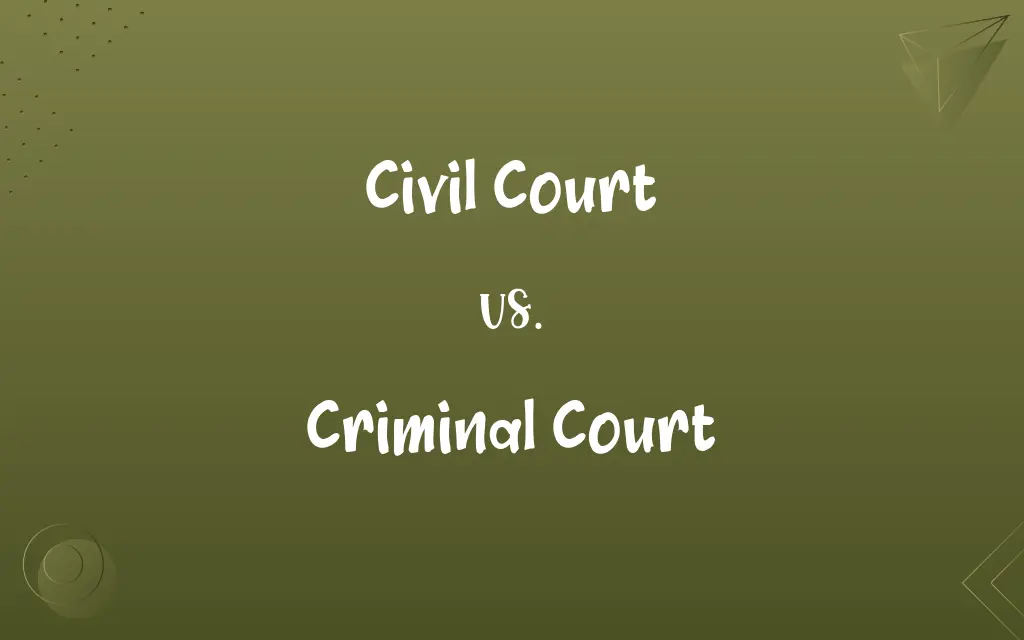Civil Court vs. Criminal Court: Know the Difference

By Shumaila Saeed || Updated on December 26, 2023
Civil Court deals with disputes between individuals or organizations, typically involving private rights, while Criminal Court handles cases where an individual is accused of committing a crime against society or the state.

Key Differences
Civil Court and Criminal Court are two distinct entities within the legal system. Civil Court primarily focuses on resolving disputes between individuals or organizations, often involving matters like contracts, property, or family law. Criminal Court, on the other hand, deals with cases where a person is accused of actions that are offenses against society or the state, such as theft or murder.
Shumaila Saeed
Dec 25, 2023
In Civil Court, the parties involved are usually a plaintiff who brings the case and a defendant who responds to the allegations. In Criminal Court, the state or government takes the role of the prosecutor, charging an individual, known as the defendant, with a crime. The stakes in Criminal Court are typically higher, often involving penalties like imprisonment, while Civil Court usually results in monetary compensation or specific actions.
Shumaila Saeed
Dec 25, 2023
The burden of proof differs significantly between Civil Court and Criminal Court. In Civil Court, the plaintiff must prove their case by a preponderance of the evidence, which means more than 50% certainty. In Criminal Court, the prosecution must prove the defendant's guilt beyond a reasonable doubt, a much higher standard due to the potential consequences like imprisonment or even capital punishment.
Shumaila Saeed
Dec 25, 2023
Another key difference between Civil Court and Criminal Court is the rights afforded to defendants. In Criminal Court, defendants have various protections under the law, including the right to an attorney and the right against self-incrimination. Civil Court, while still fair, does not offer the same level of protection, as the consequences are not as severe as in criminal cases.
Shumaila Saeed
Dec 25, 2023
Finally, the outcomes in Civil Court and Criminal Court vary greatly. Civil Court cases often end in financial settlements, injunctions, or specific performance orders. Criminal Court cases, however, can result in imprisonment, probation, fines, community service, or other forms of punishment. The aim of Criminal Court is to punish and deter criminal behavior, while Civil Court seeks to resolve disputes and provide restitution.
Shumaila Saeed
Dec 25, 2023
ADVERTISEMENT
Comparison Chart
Typical Outcomes
Monetary compensation, injunctions
Imprisonment, fines, probation
Shumaila Saeed
Dec 25, 2023
Defendant's Rights
Limited legal protections
Extensive protections (e.g., right to attorney)
Shumaila Saeed
Dec 25, 2023
ADVERTISEMENT
Civil Court and Criminal Court Definitions
Civil Court
Jurisdiction over cases such as divorce, custody, and property.
Their divorce proceedings were finalized in Civil Court.
Shumaila Saeed
Dec 13, 2023
Criminal Court
Handles violations of criminal law, such as theft or assault.
The assault case was heard in Criminal Court.
Shumaila Saeed
Dec 13, 2023
Civil Court
Addresses legal conflicts that don’t involve criminal charges.
The business lawsuit was settled in Civil Court.
Shumaila Saeed
Dec 13, 2023
Criminal Court
A legal body that imposes penalties for criminal activities.
The Criminal Court sentenced the individual to community service.
Shumaila Saeed
Dec 13, 2023
Civil Court
A court dealing with non-criminal legal disputes.
The inheritance dispute was taken to Civil Court.
Shumaila Saeed
Dec 13, 2023
ADVERTISEMENT
Criminal Court
Jurisdiction over cases involving criminal law enforcement.
The drug trafficking case was tried in Criminal Court.
Shumaila Saeed
Dec 13, 2023
Civil Court
Handles cases involving personal rights and private matters.
The Civil Court ruled in favor of the tenant in the landlord-tenant dispute.
Shumaila Saeed
Dec 13, 2023
Criminal Court
Prosecutes individuals accused of committing criminal offenses.
The Criminal Court issued a guilty verdict in the fraud case.
Shumaila Saeed
Dec 13, 2023
Civil Court
A legal forum for resolving non-criminal disputes between parties.
The Civil Court awarded damages to the plaintiff for breach of contract.
Shumaila Saeed
Dec 13, 2023
Criminal Court
A court system for adjudicating crimes against the state or society.
The defendant was tried for robbery in Criminal Court.
Shumaila Saeed
Dec 13, 2023
Repeatedly Asked Queries
What standard of proof is required in Civil Court?
In Civil Court, the standard of proof is a preponderance of the evidence.
Shumaila Saeed
Dec 25, 2023
What is the role of a plaintiff in Civil Court?
The plaintiff in Civil Court is the party who brings the lawsuit against the defendant.
Shumaila Saeed
Dec 25, 2023
Can Civil Court cases result in jail time?
No, Civil Court cases typically result in financial compensation or specific performance orders, not jail time.
Shumaila Saeed
Dec 25, 2023
Who prosecutes cases in Criminal Court?
In Criminal Court, the state or government prosecutes cases against the accused individual.
Shumaila Saeed
Dec 25, 2023
What rights do defendants have in Criminal Court?
Defendants in Criminal Court have rights like legal representation, a fair trial, and protection against self-incrimination.
Shumaila Saeed
Dec 25, 2023
What types of cases does Civil Court handle?
Civil Court handles cases like property disputes, contract issues, and family law matters.
Shumaila Saeed
Dec 25, 2023
What is Criminal Court?
Criminal Court is where cases involving crimes against the state or society are prosecuted.
Shumaila Saeed
Dec 25, 2023
What types of offenses are tried in Criminal Court?
Criminal Court tries offenses like theft, assault, murder, and drug-related crimes.
Shumaila Saeed
Dec 25, 2023
Can Civil Court cases be appealed?
Yes, decisions in Civil Court can be appealed to a higher court.
Shumaila Saeed
Dec 25, 2023
Can you be tried in both Civil Court and Criminal Court for the same act?
Yes, it's possible to be tried in both Civil Court and Criminal Court for the same act, as they address different legal aspects.
Shumaila Saeed
Dec 25, 2023
What is Civil Court?
Civil Court is where legal disputes not involving criminal charges are resolved.
Shumaila Saeed
Dec 25, 2023
What is a civil lawsuit?
A civil lawsuit is a legal dispute brought in Civil Court, typically seeking compensation or specific actions.
Shumaila Saeed
Dec 25, 2023
Is legal representation provided in Criminal Court?
In Criminal Court, defendants have the right to legal representation, and if they can't afford it, an attorney will be provided.
Shumaila Saeed
Dec 25, 2023
How do plea bargains work in Criminal Court?
Plea bargains in Criminal Court involve the defendant pleading guilty to a lesser charge in exchange for a lighter sentence.
Shumaila Saeed
Dec 25, 2023
Can Criminal Court cases impact one’s civil rights?
Yes, convictions in Criminal Court can impact civil rights, like voting or owning firearms.
Shumaila Saeed
Dec 25, 2023
Can verdicts in Criminal Court be appealed?
Yes, defendants in Criminal Court can appeal the verdict to a higher court.
Shumaila Saeed
Dec 25, 2023
What is the burden of proof in Criminal Court?
The burden of proof in Criminal Court is beyond a reasonable doubt.
Shumaila Saeed
Dec 25, 2023
Are juries used in Civil Court?
Juries can be used in Civil Court, but not all cases require a jury.
Shumaila Saeed
Dec 25, 2023
What are common punishments in Criminal Court?
Common punishments in Criminal Court include imprisonment, fines, probation, and community service.
Shumaila Saeed
Dec 25, 2023
What happens if a Civil Court verdict is not followed?
If a Civil Court verdict is not followed, it can lead to enforcement actions like garnishment or contempt of court.
Shumaila Saeed
Dec 25, 2023
Share this page
Link for your blog / website
HTML
Link to share via messenger
About Author
Written by
Shumaila SaeedShumaila Saeed, an expert content creator with 6 years of experience, specializes in distilling complex topics into easily digestible comparisons, shining a light on the nuances that both inform and educate readers with clarity and accuracy.








































































